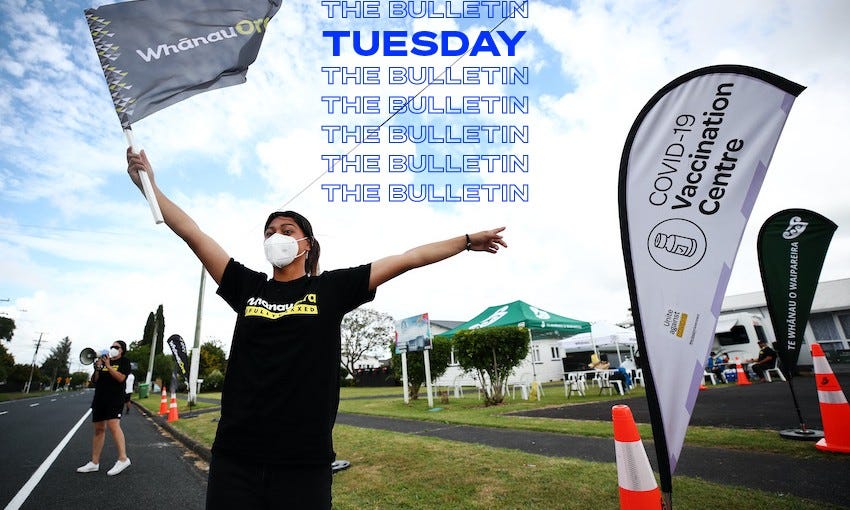Orange summer for most, Northland remains red
January’s reopening with Australia in jeopardy as PM signals caution with international border, despite a continued relaxation of domestic rules
Mōrena and welcome to The Bulletin for Tuesday, December 14, by Justin Giovannetti. Presented in partnership with Z Energy.
In today’s edition: Busy flights from Auckland tomorrow; rental affordability in decline; teacher supply scrambled by the pandemic; but first, most of New Zealand will enter 2022 under orange rules.
A Whānau Ora vaccination campaign in Auckland. (Fiona Goodall/Getty Images)
A slow transition will continue to the traffic light system. Despite rising vaccination levels across New Zealand and a growing risk posed by omicron overseas, there won’t be any drastic changes to the country’s pandemic rules this summer. Auckland and all parts of the country currently under red restrictions—excluding Northland—will move to orange on December 30. As Henry Cooke writes for Stuff, orange will “essentially mean unrestricted life for the vaccinated” at venues using vaccine passes. Auckland’s case numbers have been lower than modelling had predicted. The restrictions won’t be reviewed until January 17, at which point some parts of the country could get the thumbs up to go to the green setting. The South Island, with low case numbers and high vaccination rates, is a likely candidate for green.
Hospitality businesses warn the move will be too late. After four months of lockdown, Auckland hospitality businesses say they could use the next two weeks in orange, the NZ Herald reports, adding that some warn it will be a “sad Christmas” because of ongoing restrictions. As the prime minister pointed out yesterday, businesses using vaccine passes are nearly back to normal operations as it is. Amid the complaints, the Auckland Business Chamber said the city should be in orange because it’s the most vaccinated in the world (note: while Auckland’s vaccination level is impressive, it’s not a global leader). Act has called for an immediate move to orange, while National’s new leader has demanded a jump straight to green.
Omicron might bring some changes to the booster shot regime. The initial indications from Pfizer are that while the efficacy of its vaccine is reduced against the new variant, a third booster shot brings it up again. New Zealand already has a universal booster programme in place and the delay between second and third doses could be shortened, according to the director general of health. As RNZ reports, Ashley Bloomfield said “our key objective is to go into winter with our maximum population immunity”. That could mean cutting the delay for a booster from the current six months, to as few as three.
While most of the domestic reopening programme is chugging along, the international border faces more uncertain. Fully vaccinated New Zealanders returning from Australia were supposed to be able to avoid a stay in border facilities from January 17, but that date is now at risk. As Stuff reports, Jacinda Ardern warned yesterday that a small group of ministers will review what’s known about omicron in early January and could delay or cancel the reopening if it presents a significant risk to New Zealand. She was careful to say she didn’t want to “preempt” the decision, but her move to bring up the review unprompted should be a clear red flag to anyone considering travel to Australia. Experts have told RNZ that more will be known in a few weeks, but the country is vulnerable to an omicron outbreak.
2021 will be remembered for the spread of delta, creating one of the most challenging stories—and commercial environments—in recent memory. It made us rely even more heavily on the support of our members. If you love what we do, please consider donating today. Want another way to support us? Invite your friends and whānau to subscribe to The Bulletin and keep them across Aotearoa’s biggest stories.
Busy flight schedule as Aucklanders ready to travel on Wednesday reopening. Four months after Auckland went into lockdown, more than 12,000 people are booked on Wednesday to fly out of the city, the NZ Herald (paywalled) reports. Many are on flights to the South Island for what could be an early start to the Christmas season. After months with little traffic, the airport is now preparing for up to 27,000 flyers daily in the summer months.
The Covid numbers: There are 61 cases in hospital and 4 in ICU/HDU. There are now 9,814 cases in the delta outbreak. 97 new community cases were reported in Auckland yesterday, 1 in Bay of Plenty, 1 in Taranaki, 1 in Nelson and 1 in Canterbury. 7,524 people were vaccinated on Sunday.
The Spinoff’s Covid data tracker has the latest figures.
The country’s rental affordability is in steep decline as experts deliver a bleak forecast. Affordability across the country sank by 10% over the past year, Stuff reports, as rising housing costs and increased expenses have driven up weekly rents. Auckland and Wellington remain the most expensive rental markets, with an average of $554 and $510 a week, respectively. However, rents have shot up the fastest in the Hawke’s Bay and Bay of Plenty, up over 20% in one year in the former. It’s unclear how much rents will continue climbing in the coming year.
Covid-19 has completely scrabbled the government’s forecast of the teacher supply. John Gerritsen reports for RNZ that the education ministry has warned that it isn’t quite sure what’s going to happen next year. Teacher retention is at an all-time high of 93%, so there could be an excess of nearly 1,500 teachers, even with some quitting due to Covid-19 vaccination rules. Conversely, if younger teachers look to head overseas, there could be a shortage of 1,000 teachers. So it’ll be feast or famine for administrators looking to staff classrooms.
You aren’t part of Groundswell, founders tell people with racist and abusive signs. Calling Jacinda Ardern a communist or walking around with Trump flags isn’t part of the group’s agenda, which is focused on the over-regulation of farming, Groundswell’s founders told the NZ Herald. The group’s message has been muddied during recent protests by people with banners that question climate change or attack the speaking of te reo Māori. The big banners get a lot of attention and turn away people who could be supporters. The founders say they really just want to talk about farming.
Tarras locals split over plans for international airport. The central Otago settlement is in decline according to locals, with only a dozen students left on the local roll and most amenities gone. According to RNZ, a proposal to build a new international airport has been divisive, with some seeing an engine for renewal, while others like things as they are. It could be another two years before Christchurch airport decides whether to go forward with its audacious plan to scoop up future traffic from Queenstown airport, which is only a short drive away.
Got some feedback about The Bulletin, or anything in the news?
Get in touch with me at thebulletin@thespinoff.co.nz
Right now on The Spinoff: Felix Walton writes that carbon credits might not be the solution we need to the climate crisis. Anna Rawhiti-Connell argues why she welcomes a cigarette ban after two decades of smoking. Charlotte Muru-Lanning explains why food banks aren’t a viable solution to our problems. Saraid de Silva looks at the hottest novel in New Zealand right now. Peter Bale, in our sister publication The Bulletin world weekly, looks back at a long 2021.
Former Ireland coach reported to join All Blacks as selector. After a tough season, Stuff reports that the All Blacks are looking to appoint Joe Schmidt as a selector. As Ireland’s coach, he was considered one of the best minds in the game and beat the All Blacks twice as he led Ireland to the top of the world rankings. He is expected to replace Grant Fox on the panel and give the All Blacks a fresh set of eyes and new ideas as the team prepares for 2022.
That's it for The Bulletin. If you want to support the work we do at The Spinoff, please check out our membership programme.








